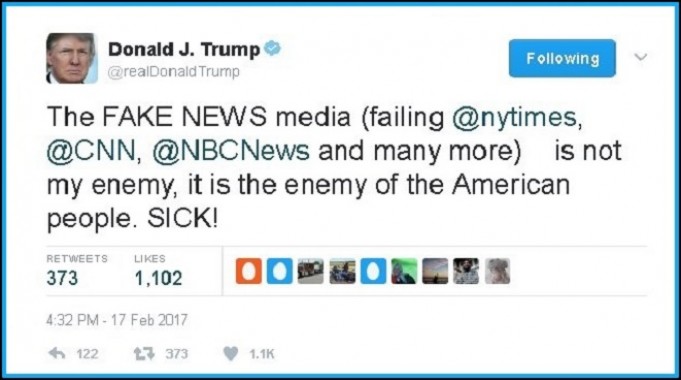Can journalism withstand Trump?
Journalists are dismayed by the insults hurled at them by the U.S. President Donald Trump, the most powerful man in the world. Their self-proclaimed role as the ‘watch dog’ of the government and other powerful forces in the most revered democratic system in the world, has been put under the microscope by their democratically elected leader. Whether it is the corridors of power in Washington D.C. or elsewhere, words such as ‘fake news’, ‘very fake news’ and the ‘enemy of the people’ are echoing in the public and private spheres.
Despite a strong expression of incredulousness, anger and frustration against Trump and his allies’ disparaging of the news media, the question remains – can journalism withstand such a powerful attack from a vociferous political leader and his followers? Has journalism’s credibility been tarnished forever? Or, will this attack on journalism prove to be a blessing in disguise for the beleaguered profession in which audiences turn to quality journalism to know the truth?
The reality is that Trump and his administration are using the fault lines in journalism to question journalism’s legitimacy as a ‘watch dog’. Let’s consider some of the realities of journalism: There is no accreditation or specified training needed to enter the profession. Anyone covering news for any kind of media outlet can call him/herself a journalist. Journalists and their organisations have often understandably resisted the temptation to be regulated by anyone else, leave alone the government of the day, leaving it to be exposed as an industry which is a law unto itself.
The codes of ethic or rules of media self-regulation, which at best are modulated by circumstances, have often let journalism down when rogue journalists and media organisations have mixed news, entertainment, and gossip to entice audiences to their outlet. As a result, the incrementally built credibility in the 20th century, where trust in journalism was built on non-partisan, accurate and fair reporting practices, has been lost over the past few decades. Meanwhilenew media technologycompanies have encroached on traditional news media’s profitability.
However, the greatest contradiction in the role of journalism in a democratic society is the definition of news itself - is it a product or a public service? Understandably, media proprietors want to pay for good journalism and make a profit, so ‘news’ along with other media messages becomes ‘a product’ to attract audiences, and yet ‘news’ remains ‘a public service’ for the same citizens where journalists shine the light of ‘truth’ on those in powerful positions in society.
Well-known self-proclaimed independent news organisations such as The New York Times and so-called conservative outlets such as Breitbart News, are both equally protected under the freedom of speech act. Audiences make a choice to read one news outlet’s news stories over the other, or, news and opinion published by both news organisations.
The danger is when an elected leader like Trump and his powerful friends start calling well-known news media the ‘enemy of the people’ and boycotting some of the news outlets to punish them for publishing stories which Trump refers to as ‘very fake news’.
With the U.S. population polarized for and against President Trump, the mainstream news media seem to be locked in a fight for survival, not certain if a majority of the population believes in them or those who call them the ‘enemy’.
Besides providing access to ‘sympathetic’ news outlets, Trump and other politicians are bypassing the so called ‘enemy’ journalists by practising the art of mass self-communication on social media networking sites such Facebook, Twitter and Google. These networking platforms act like a glue for like-minded people where ‘like’, retweet and sharing reinforces a group’s biases. In the echo chambers of social media, certain stories and messages go viral, including fake news stories during the recent U.S. elections.
Investigation into these fake news stories found that many of them were produced by teenagers in Veles, Macedonia, to make some money and gain experience. Although Facebook and other networking sites have announced plans to crack down on the distribution of fake news, a quick check of the top 20 stories which went viral in 2016 shows that almost all the ‘fake news’ stories identified by Buzzfeed are still ‘sharable’ on Facebook.
Only two stories had been removed from the Facebook timeline, including the most popular “Obama Signs Executive Oder Banning the Pledge of Allegiance in Schools Nationwide”.
Similarly, of the top 20 fake news sites identified by The Washington Post, most of them are still active. Meanwhile, the mainstream media and other fact-checking sites such as Politifact.com and FactCheck.org continue to investigate the veracity of ‘fake news’ stories distributed on the internet to protect the profession’s credibility.
However, the persistent reference to the prevalence of ‘fake news’ by both sides – journalists and politicians – may yet prove to be a scourge for quality journalism where the stigma of fake news destroys journalism’s credibility once and for all.
Usha M. Rodrigues, PhD, is a Senior Lecturer in Journalism at Deakin University, Australia. Follow her research on Researchgate.net and Twitter @umanchanda.







